

Discover more from Oxymoron
Why don't we care about peace?
There's something uncomfortably absent from the sustainability conversation
When I say we don’t care, I mean you and me - sustainability people.
Before I dive in properly, I'm going to say that this is probably one of the most controversial articles I've posted here on Oxymoron and I know I’m being a little provocative in the title here. I’ve written about this topic twice before and they’ve been some of my least popular posts, so either third time will be the charm or I’m about to lose a bunch of subscribers.
I hope you'll at least trust me that my intentions are good and hear me out, even if you don't necessarily agree with me.
I'm writing this now because with war still waging nearly three years after Russia’s invasion of Ukraine and now an ongoing genocide1 in Palestine, I'm both concerned and confused by the absence of calls for peace within the sustainability world.
Everywhere I look, whether online, in person or at events, there are people talking passionately about environmental topics like carbon emissions, biodiversity loss, the circular economy and regenerative farming, as well as lots of talk about social topics like living wages, diversity and four day work weeks. But it's very, very rare that I see people calling for peace in any meaningful way. It rather uncomfortably reminds me of the old Fawlty Towers joke, “Don’t mention the war!”
For a long time, I thought it was because war was seen as a separate issue to sustainability, which is probably true to some extent, but I'm increasingly getting the sense that people are actually afraid to talk about it. In an increasingly polarised world, caring people are often harshly criticised for saying anything that goes against the prevailing state propaganda, or for even suggesting that there is propaganda.
I'm here to make the case that us sustainability folk should stop ignoring the uncomfortable topic of war and look at it through the lens of people and planet. When we do so, it quickly becomes apparent that no matter what your political views, peace is a fundamental requirement of a sustainable world.
What do we really care about?
The absence of conversation about war in sustainability circles brings into question what we really mean by sustainability. When we say that we care about sustainability, what exactly is it that we are saying we care about?
Forget all the fancy textbook definitions of sustainability for a minute and just ponder what it is really all about.
I believe that at its core, caring about sustainability either means that we care about the health of our home planet and the life it supports, or it means that we care about the wellbeing of humanity and understand that planetary wellbeing is central to human wellbeing. Either way we look at it, it means that we care about the planet, care about humanity, or both. If that’s true, then how can we ignore war?
What does war mean for the planet?
If we look at sustainability as a care for wellbeing of our planet, it doesn't take a great leap of the imagination to realise that the industry, and yes war is an industry, whose raison d'etre is to blow things up, might not be very good for it.
Indeed, military activity accounts for 5.5% of global carbon emissions2, which if it was a country would make it the fourth largest polluter after China, the USA and India. It’s also possible that this is an under-estimate because this figure doesn’t factor in the wider impacts of war such as fires at fossil fuel storage facilities and buildings; fires and other damage to forests, crops and other biological carbon stores; movement of refugees; healthcare for survivors; post-conflict reconstruction; and climate heating due to the effects of military aviation emissions in the stratosphere. It’s quite possible that this environmental ‘collateral damage’ is even bigger than the direct impacts.
It’s particularly strange then that the IPCC, who we rely on for the most robust scientific information about climate change, almost entirely ignore military emissions. The UN Framework Convention on Climate Change obliges some countries to report their national greenhouse gas emissions but does not require reporting of military emissions, as if they magically don’t count. And it’s not just carbon emissions, as war is by its very nature destructive and unpredictable.
Here we are feeling guilty for driving to work or buying a bottle of water when we’re thirsty, while the military blow shit up without us batting an eyelid.
And then there’s the thing that we really don’t want to think about - nuclear weapons. It probably doesn’t need to be spelled out but according to the International Campaign to Abolish Nuclear Weapons (ICAN), “nuclear war and biodiversity loss are interconnected existential threats that are not frequently discussed - or tackled - together. There are clear areas where these crises overlap, from the immediate impacts of radioactivity on ecosystems and the need to remediate the devastating environmental legacy of nuclear weapons use and testing, to the all-encompassing destruction nuclear war could wreak on the world’s ecosystems and food chains”.
They also highlight the environmental harm that takes place before they are even used in war, “from uranium mining, through production, to the thousands of nuclear tests over the decades, to nuclear waste dumps”.
The Doomsday Clock created in 1947 by the Bulletin of the Atomic Scientists stated in its 2024 statement that “we expressed our heightened concern by moving the Clock to 90 seconds to midnight—the closest to global catastrophe it has ever been”.
I could go on, but hopefully you get the idea.
I’ve seen people heavily criticised on social media for talking about the environmental impact of war as if it somehow undermines the humanitarian issues, but they’re not mutually exclusive. War is hugely destructive to the environment and to people.
So let’s now look at the human side
In reality, a lot of people in the sustainability movement are motivated by a care for the wellbeing of humanity, now and in the future. If it's humanity that we care about, what cause could possibly be more important than peace?
Although it varies drastically from year to year, data from the World Bank puts annual war related deaths at approximately 500,0003 and that’s not accounting for the people who are injured or otherwise have their lives destroyed. I’m not going to go deeper on this because it’s too painful, but I’m sure you get the picture.
There’s also the financial cost of war. Total military spending in 2023 was $2.4 trillion4, in a world where we apparently don't have enough money to provide health care, education, food and shelter for all of the world's citizens. This is an absurd amount of money. To put it in context, estimates on the cost of ending world hunger range from $30 billion to $300 billion per year, a fraction of what we spend on war. Imagine what we could do to create a better world if we had $2.4 trillion a year to spend on it.
If sustainability is about the wellbeing of humanity, world peace is surely the foundation stone upon which we should be building.
It's also a business issue
This is all very well in concept, but from the perspective of trying to run a sustainable business, war and peace can seem a little abstract. We can wrap our heads around the idea of packaging waste or energy use in our businesses, but unless we make weapons, war seems like something that's nothing to do with us.
In some ways it does have nothing to do with us, but we can also have our blind spots.
For example, many businesses service the military industrial complex without even noticing, selling products and services not just to the military itself, but to the litany of corporations involved with it. This is likely the case for many companies in sectors ranging from engineering, to software, to food, to finance.
Even Patagonia, the poster child of sustainable business, developed and supplied clothing to the US military going back as far as the late 80’s. They kept it very quiet and then apparently ‘separated’ from their military clothing division in 2022, not long after they received some heat for it in the media. You might think there’s nothing wrong with that, but for a company whose stated mission is to save our home planet, it feels somewhat incongruous to me. In fact, I’m not sure how they squared that with the B Corp criteria which lists “Defense, offensive weapons, firearms and munitions” as a ‘Controversial Industry’ and has a 0% tolerance threshold for B Corps taking revenue from clients in this sector.
In my own business, Wholegrain, we've been approached a number of times by organisations that have an uncomfortably cosy relationship with the military. These days, unless they have a credible and explicit pro-peace agenda, our client screening process automatically rejects these projects, but this wasn't always the case and it required us to be proactive in putting this filter in place.
In fact, one of the toughest experiences in all my years of running the company was when we lost one of our biggest clients because we refused to build a campaign website to lobby the UK government to back Israeli military action in Gaza. I took a purely pro-peace stance, but I was accused of being anti-Semitic and all other projects with the same client were cancelled. Looking back years later though, I don’t have any regrets.
So there are direct business decisions relating to the military even in unlikely businesses like ours, but it’s not just direct business dealings that matter.
Our voices as companies and brands also carry weight in our society. We seem to believe this when it comes to environmental issues, so why not when it comes to peace? Granted, there have been a lot of companies that have displayed pro-Ukraine messaging over the past couple of years, but it’s been somewhat eerie to see how rarely these have been explicitly pro-peace messages.
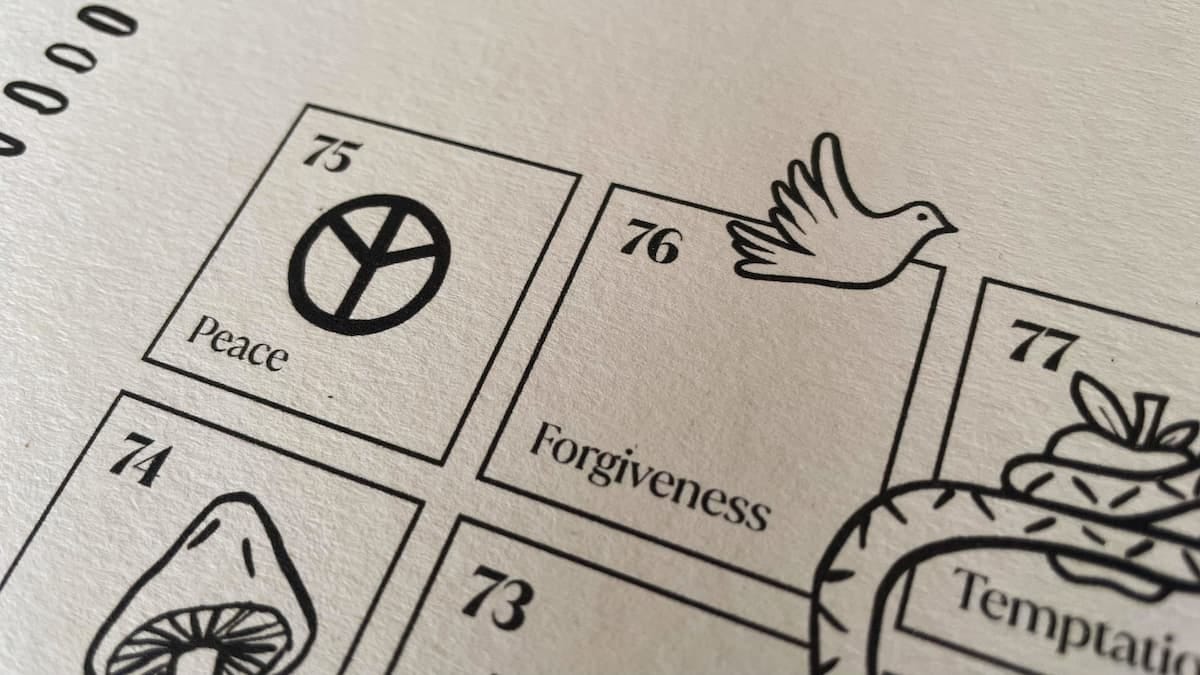
Where has the peace movement gone?
In February 2003, the largest protest in British history took place when approximately 1 million people marched on the streets of London protesting against the impending war in Iraq. The people came out in their masses to demand peace, and it failed.
I can't help but wonder if it crushed the spirit of an entire country to the extent that we are still feeling the effects two decades later. There have been strong public peace movements at various points in modern history but in this time of growing global conflict, it is conspicuously absent. Perhaps now is the time for us to reclaim our voices.
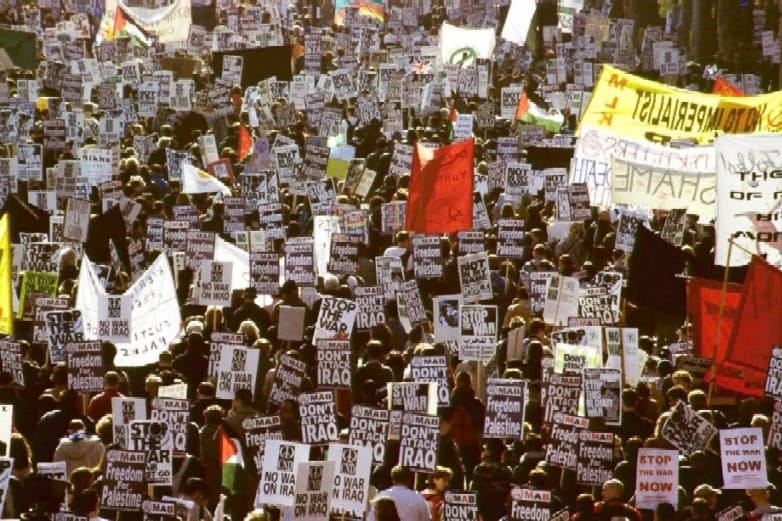
But then there's the issue of fear. The truth is that nearly all humans are anti-war at heart and despite my provocative title to this post, I believe that pretty much everyone who cares about sustainability, and most of the general public, care about peace. So why don’t we talk about it?
I’ve seen very few people in sustainability circles publicly calling for peace in recent times, but I have heard many in private saying they feel afraid to say anything for fear of being character assassinated. They feel that the world is so polarised that any comment that challenges the mainstream narrative, even a call for peace, would make them and their organisations vulnerable to attack.
Recently, the few people who I have seen posting pro-peace messages on social media have been using coded spellings for words such as genocide to avoid being censored by the big tech algorithms. This is truly dystopian.
Let’s make sustainability stand for peace
I believe that most of us in the sustainability world care deeply but are currently either afraid to say anything or have been made to feel that our voices don’t matter. But our voices matter on the subject of peace just as they do on all the other issues that we care about.
So I encourage you, if you care about our planet and you care about humanity, to use your voice to help put world peace at the top of the sustainability agenda. You can do this within your business in whatever way feels right to you, but it could be as simple as having clear pro-peace policies, using your brand to spread pro-peace messaging, including it in talks and presentations, supporting pro-peace charities and campaigns, or going as far as limiting commercial relationships with organisations in the military-industrial complex.
As a final note on this topic, I want to clarify that promoting peace is in no way intended as a disrespect to those people who dedicate their lives to serving their countries in the military. That’s a popular narrative but I personally believe it’s part of the propaganda that stops us asking questions; questions that could help ensure that we never put people in unnecessary danger, especially on false pretences.
So that’s it. If you made it this far, thanks for sticking with me and if you're already flying the flag for peace, thank you! I wouldn't have had the guts to publish this if it wasn't for people like you.
I wish you a peaceful day and if you want to dive further, I’ve included a few links to pro-peace organisations below.
Pro-peace organisations
Also check out the Conflict and Environment Observatory who study the relationship between the environment and military conflict.
There are of course many more so please do feel to share your favourites in the comments below.





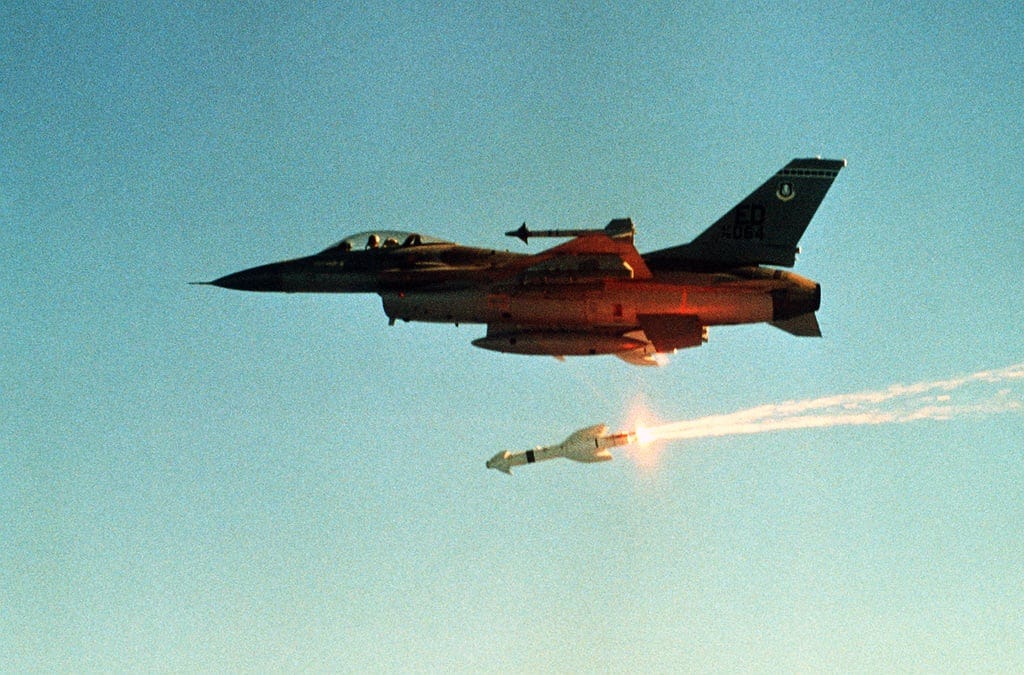
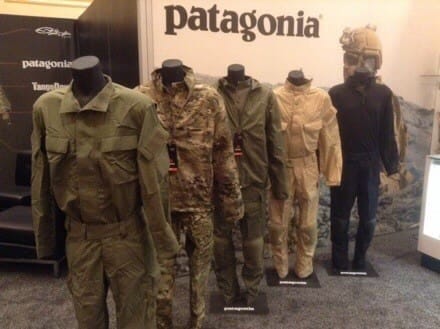







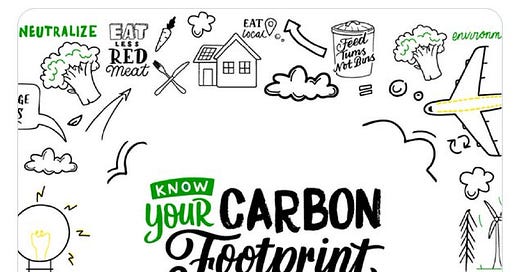



Super! I enjoyed your post, Tom. It is so important topic and it needs much more visibility. And I admire your decision to turn dowd all the customers who do not align with your values. I wish to see it more.
I'm so shocked about Patagonia. I didn’t know this, Tom. Thank you for shedding light on this. I wish this kind of information were more readily available. I use an app called Good On You, but it mainly shows sustainability ratings for companies and doesn’t cover these kinds of issues.